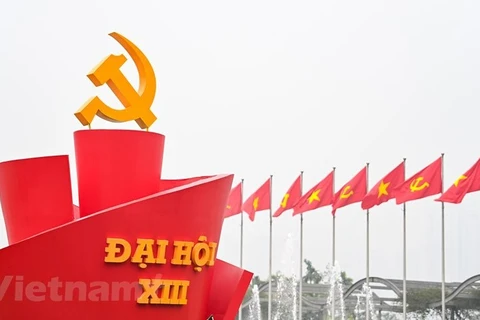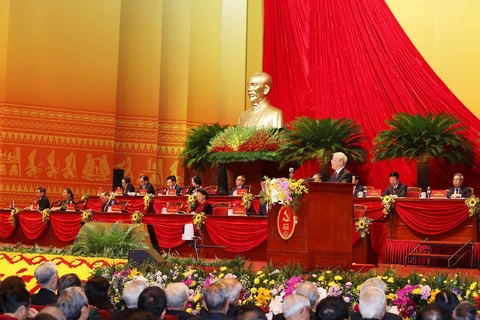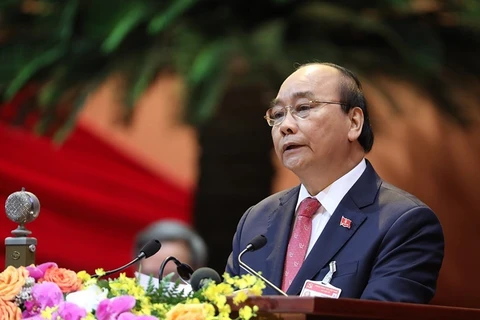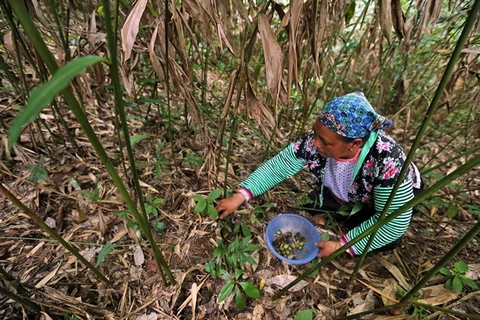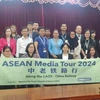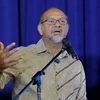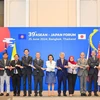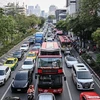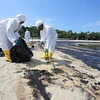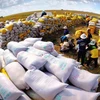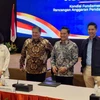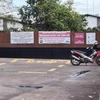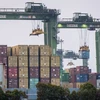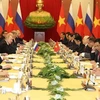Hanoi (VNA) - Vietnam has conditions and potential to become a developed country in the future as it boasts rich resources and abundant labour, high education lever, geographical advantages connecting Asia and the world, efficient government and patriotic citizens.
The remark was made by JaeHo Jeong, Hanoi Bureau Chief of the Republic of Korea's HANKOOKILBO, on January 26 when he was present at the National Convention Centre in Hanoi to cover the opening ceremony of the 13th National Congress of the Communist Party of Vietnam (CPV), the most important political event of Vietnam.
“I think Vietnam will have a brighter future than the present,” he said, adding “its role will increase amid the rapidly changing global situation”.
More industrial facilities based in China will be relocated to Vietnam, and it will also serve as a key country connecting Europe and Asia with the Europe-Vietnam Free Trade Agreement (EVFTA) taking effect. Nearby Indochinese countries are predicted to take a long time to catch up with Vietnam due to a lack of industrial infrastructure.
“As the current trend continues, it is certain that Vietnam will solidify its position as a leader of Southeast Asia. The successful ASEAN chairmanship last year will maintain its high status in the future,” the reporter from the Republic of Korea (RoK) noted.
Vietnam's economic development and social stability over the past decade are very impressive, he said, attributing these achievements to the Vietnamese Government's clear plan and the active participation of the people.
JaeHo Jeong also forecast that RoK companies' investment in Vietnam will increase further as the Southeast Asian nation still provides an attractive investment environment for foreign companies despite the COVID-19 crisis.
Due to the conflict between the US and China, many Korean firms are already relocating their factories to Vietnam and “brown” investments, including joint ventures and acquisitions of stakes by Vietnamese companies, continue to increase.
The sense of national stability coming from the successful pandemic control is one of the important reasons for the increase in investment by Korean companies, he said, adding there is a high possibility that new investments by RoK electronic components and hi-tech companies will increase in the near future.
Sharing views with the RoK colleague, reporter Ngo Xuan Tung, who works for CNA Singapore, said that Vietnam has the potential and conditions to realise its goal of becoming a developed country by 2045 because it has a young population and an attractive investment environment.
However, in the context of many new and complicated developments in the region and the world, Vietnam will face many challenges in realizing the above goal.
“Vietnam needs to have policies to concretise the realisation of targets with synchronous solutions from the central to local level,” he underlined.
The story of development poses a challenge to the environment that people are very concerned about, he said, adding that Vietnam has paid much attention to ensuring the environment for sustainable development by selecting investors based on quality instead of quantity and attaching importance to the factor of increasing technology content.
Vietnam's potential and strengths, if fully tapped, will become conditions for the country to make its dream come true, he noted.
Meanwhile, John Harding, an Australian journalist who boasts many years of working in Vietnam, spoke highly of achievements made by the country under the leadership of the CPV over the past time, especially in COVID-19 prevention and control.
“I think the CPV had done a good job over the years. When it gave instructions about what to do when COVID-19 hit, people listened. They stayed at home, wore masks, and didn’t complain. And it has been controlled here so far. I think that’s a result of people’s faith in the party and that it knows what it’s doing,” he said.
“Vietnam’s growth is pretty high, so it is noted by political leaders, economists, and investors around the world,” he added./.
The remark was made by JaeHo Jeong, Hanoi Bureau Chief of the Republic of Korea's HANKOOKILBO, on January 26 when he was present at the National Convention Centre in Hanoi to cover the opening ceremony of the 13th National Congress of the Communist Party of Vietnam (CPV), the most important political event of Vietnam.
“I think Vietnam will have a brighter future than the present,” he said, adding “its role will increase amid the rapidly changing global situation”.
More industrial facilities based in China will be relocated to Vietnam, and it will also serve as a key country connecting Europe and Asia with the Europe-Vietnam Free Trade Agreement (EVFTA) taking effect. Nearby Indochinese countries are predicted to take a long time to catch up with Vietnam due to a lack of industrial infrastructure.
“As the current trend continues, it is certain that Vietnam will solidify its position as a leader of Southeast Asia. The successful ASEAN chairmanship last year will maintain its high status in the future,” the reporter from the Republic of Korea (RoK) noted.
Vietnam's economic development and social stability over the past decade are very impressive, he said, attributing these achievements to the Vietnamese Government's clear plan and the active participation of the people.
JaeHo Jeong also forecast that RoK companies' investment in Vietnam will increase further as the Southeast Asian nation still provides an attractive investment environment for foreign companies despite the COVID-19 crisis.
Due to the conflict between the US and China, many Korean firms are already relocating their factories to Vietnam and “brown” investments, including joint ventures and acquisitions of stakes by Vietnamese companies, continue to increase.
The sense of national stability coming from the successful pandemic control is one of the important reasons for the increase in investment by Korean companies, he said, adding there is a high possibility that new investments by RoK electronic components and hi-tech companies will increase in the near future.
Sharing views with the RoK colleague, reporter Ngo Xuan Tung, who works for CNA Singapore, said that Vietnam has the potential and conditions to realise its goal of becoming a developed country by 2045 because it has a young population and an attractive investment environment.
However, in the context of many new and complicated developments in the region and the world, Vietnam will face many challenges in realizing the above goal.
“Vietnam needs to have policies to concretise the realisation of targets with synchronous solutions from the central to local level,” he underlined.
The story of development poses a challenge to the environment that people are very concerned about, he said, adding that Vietnam has paid much attention to ensuring the environment for sustainable development by selecting investors based on quality instead of quantity and attaching importance to the factor of increasing technology content.
Vietnam's potential and strengths, if fully tapped, will become conditions for the country to make its dream come true, he noted.
Meanwhile, John Harding, an Australian journalist who boasts many years of working in Vietnam, spoke highly of achievements made by the country under the leadership of the CPV over the past time, especially in COVID-19 prevention and control.
“I think the CPV had done a good job over the years. When it gave instructions about what to do when COVID-19 hit, people listened. They stayed at home, wore masks, and didn’t complain. And it has been controlled here so far. I think that’s a result of people’s faith in the party and that it knows what it’s doing,” he said.
“Vietnam’s growth is pretty high, so it is noted by political leaders, economists, and investors around the world,” he added./.
VNA

